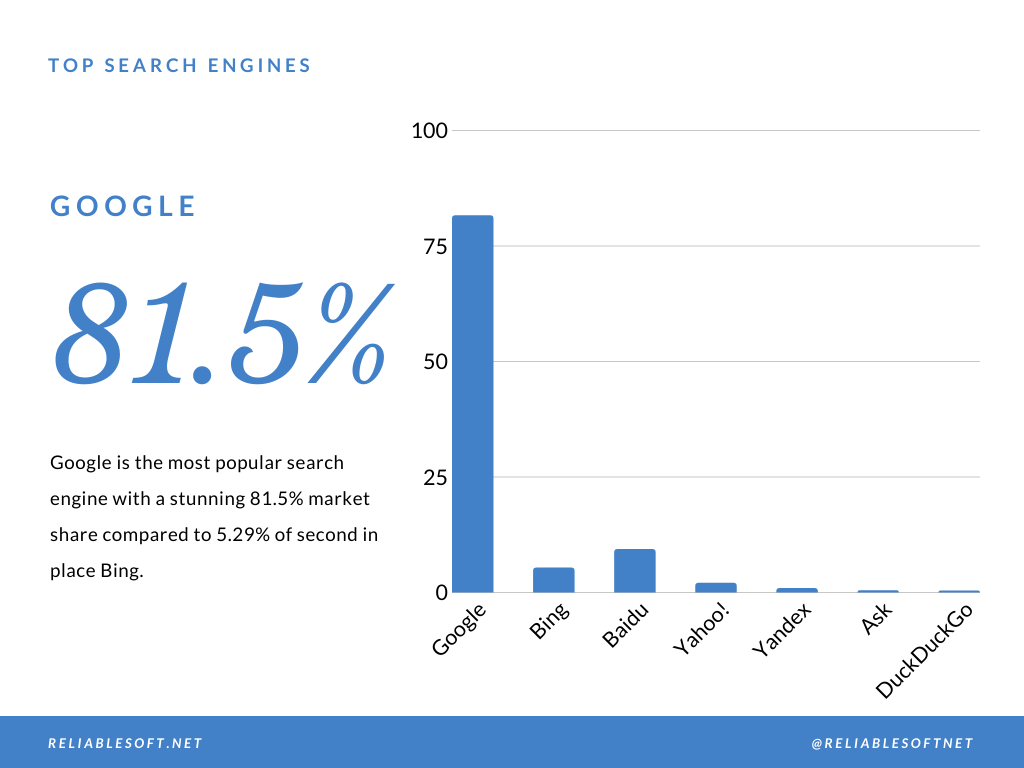Nowadays, one of the most prominent online marketing strategic plans is affiliated with the Search Engine world. Yes! Of course, you guessed it right. It is none other than optimization. Whereby Search Engine Optimization (in short SEO) is part of the comprehensive marketing discipline focused on growing organic visibility (non-paid) search results.
In other words, it’s the process of improving the position of your website’s appearance in the “organic search results.” For example, returned by sites such as Google, Yandex, Bing, Yahoo, etc. And as a matter of fact, Search Engine Optimization (SEO) isn’t just about building yourself search engine-friendly websites. But it’s more about various ways to rank your content.
As well as how to make your website better for the best user experience. Furthermore, our professional team believes that these principles go hand-in-hand. As the name suggests, Google-friendly sites allow a clear and transparent flow of page content on search engines — especially the Google custom search engine followed by others like Bing, Yahoo, AOL, and Yandex.
But the main question today is, what do Search Engines mean? Do you have any idea? This is the easiest and, at the same time, one of the most time-consuming ways of collecting ideas for website content optimization. You only need to google your keywords and look at the actual Search Engine Results Page (SERP) that appears as you requested. But how to get there?
What Is A Search Engine?
To enumerate, Search Engine is software, usually accessed on the Internet, that searches a database of information according to the website user query through the search results page. The engine provides a list of results that best match what the user is trying to find. Today, there are many different search engines available on the Internet, each with its own abilities and features.
In other words, a search engine is a software program that helps people find the information they are looking for online using keywords or phrases. The first search engine ever developed is Archie, which was used to search for FTP files, and the first text-based search engine is Veronica, to be precise. Currently, the most popular and well-known search engine is Google.
Other popular search engines include AOL, Ask.com, Baidu, Bing, Yahoo, and the like. For users, a search engine is accessed through a browser on their computer, smartphone, tablet, or another device.
Which Are The Most Commonly Used Search Engine Platforms?
Besides Google and Bing, other search engines may not be well known. But still serves millions of search queries per day. It may be a shocking surprise for many, but Google is not the only search engine available today! Several search engines want to take Google’s throne. But none of them is ready (yet) to even pose a threat. Below is an illustration of the topmost search engines:

What Is A Web Browser?
A Web Browser is basically software that is used to access the internet. Whereby, a web browser lets you visit websites and do activities within them like login. As well as, view multimedia, link from one site to another, visit one page from another, print, send, and receive an email. Among many other activities.
The most common browser software titles on the market are Microsoft Internet Explorer, Google Chrome, Mozilla Firefox, Apple Safari, and Opera. Browser availability depends on the operating system your computer is using. For example, Microsoft Windows, Linux, Ubuntu, and Apple MacOS, among others.
For instance, when you type a web page address such as www.josephmuciraexclusives.com into your browser, that web page in its entirety is not actually stored on a server ready and waiting to be delivered. In fact, each web page that you request is individually created in response to your request.
You are actually calling up a list of requests to get content from various resource directories. Or servers on which the content for that page is stored. It is rather like a recipe for a cake. Whereby, you have a shopping list of ingredients (requests for content). That, when combined in the correct order, bakes a cake (the web page).
The page may be made up of content from different sources. Images may come from one server, text content from another, and even scripts. Such as date scripts from another and ads from another. As soon as you move to another page, the page that you have just viewed disappears. This is the dynamic nature of websites.
How Does A Search Engine Tool Work?
Today, most new browsers use an Omnibox, which is a text box at the top of the browser. The Omnibox allows users to type in a URL or a search query. You can also visit one of the major search engine home pages to perform a search. With this in mind, you can read and learn more about How A Search Engine Works in detail.
If you are a website developer, designer, small business owner, marketing professional, or even a website owner, you must consider the search engine basics. At the same time, try thinking of creating a personal blog or website for your business. A clear understanding of how search works can help you create a website that search engines can understand.
As we mentioned, a search engine is a web-based tool that enables users to locate information on the World Wide Web per user request. Famous examples of search engines are Google, Yahoo!, and MSN Search. Search engines utilize automated software applications (robots, bots, or spiders) that travel along the Web, following links from page to page, site to site.
The information gathered by the spiders is used to create a searchable index of the Web. Every search engine uses different complex mathematical formulas to generate search results. The results for a specific query are then displayed on the SERP. Search engine algorithms take the key elements of a web page, including the page title, keyword density, and content relevancy.
Related Resource: How SEO Ranking In SERPs Is Done For Websites To Rank High
And then, they come up with a ranking for where to place the results on the pages. Each search engine’s algorithm is unique, so a top ranking on Yahoo! does not guarantee a prominent ranking on Google, and vice versa. To make things more complicated, the algorithms used by search engines are not only closely guarded secrets, but they are also constantly changing.
This means that the criteria to optimize a site best must be surmised through observation, as well as trial and error — not just once, but continuously. Search engines only “see” the text on web pages and use the underlying HTML structure to determine relevance. Large photos or dynamic Flash animation mean nothing to search engines, but the actual text on your pages does.
Having a website that search engines like Google, Bing, Yahoo, Yandex, DuckDuckGo, and others like has a number of added benefits. It’s the first step you need to take before even dealing with SEO (Search Engine Optimization) or any other Search Engine Marketing (SEM) tasks. It’s worth mentioning that search engines are complex computer programs.
Before they even allow you to type a query and search the web, they have to do a lot of preparation work so that when you click “Search”, you are presented with a set of precise and quality results that answer your question or query. What does ‘preparation work’ includes? Two main stages. The first stage is the process of discovering the information.
And the second stage is organizing the information. So that it can be used later for search purposes, this is generally known in the Internet World as Crawling and Indexing.
Crawling
Search engines have a number of computer programs called web crawlers (thus the word Crawling). In that case, they are responsible for finding information that is publicly available on the Internet. To simplify a complicated process, it’s enough for you to know that the job of these software crawlers (also known as search engine spiders) is.
Similarly, to scan the Internet and find the servers (webservers) hosting websites. They create a list of all the webservers to crawl, the number of websites hosted by each server and then start work. They visit each website and by using different techniques. And try to find out how many pages they have. Whether it is text content, images, videos or any other format.
Like CSS, HTML, javascript, etc. When visiting a website, besides taking note of the number of pages they also follow any links. Either pointing to pages within the site or to external websites. And thus they discover more and more pages. They do this continuously and they also keep track of changes made to a website. So that they know when new pages are added.
Or rather, deleted when links are updated, etc. If you take into account that there are more than 130 trillion individual pages on the Internet today. And on average thousands of new pages are published daily; you can imagine this is a lot of work.
Why care about the crawling process?
When optimizing your website for search engines, your first concern is ensuring they can access it correctly. Otherwise, if they cannot ‘read’ your website, you shouldn’t expect much in terms of high rankings or search engine traffic.
As explained above, crawlers have a lot of work to do, and you should try and make their job easier. There are several things to do to ensure crawlers can discover and access your website the fastest possible way without problems.
Consider the following elements:
- Use Robots.txt to specify which website pages you don’t want crawlers to access. For example, pages like your admin or backend pages and other pages you don’t want to be publicly available on the Internet.
- Big search engines like Google and Bing have tools (aka Google Webmaster Tools (GWT) ) you can use to give them more information about your website (number of pages, structure, etc.) so that they don’t have to find it themselves.
- Use an XML Sitemap to list all essential pages of your website so that the crawlers can know which pages to monitor for changes and which to ignore.
Indexing
Crawling alone is not enough to build a search engine. Information identified by the crawlers needs to be organized, sorted, and stored so that the search engine algorithms can process it before being made available to the end-user. This process is called Indexing. Search engines don’t keep all the information on a page in their index.
But they keep things like when it was created/updated, the title and description of the page, type of content, associated keywords, and incoming and outgoing links. And a lot of other parameters that are needed by their algorithms. Google likes to describe its index as the back of a book (a giant book).
Why care about the indexing process?
It’s straightforward if your website is not in their index, it will not appear for searches. This also implies that the more pages you have in the search engine indexes, the more your chances of appearing in the search results when someone types a query. Notice that we mentioned the word ‘appear in the search results,’ which means any position.
And not necessarily on the top positions or search result pages. To appear in the first 5 positions of the SERPs (search engine results pages), you must optimize your website for search engines. Using the process we mentioned herein called Search Engine Optimization or SEO in short.
Ranking
The third and final step in the process is for search engines to decide which pages to show in the SERPS and in what order when someone types a query. This is achieved through the use of search engine ranking algorithms. These are pieces of software with several rules that analyze what the user is looking for and what information to return. These rules and decisions are made based on the information in their index.
How do search engine algorithms work?
Over the years, search engine ranking algorithms have evolved and become complex. In the beginning (think 2001), it was as simple as matching the user’s query with the page’s title, but this is no longer true. Google’s ranking algorithm considers more than 255 rules before making a decision, and nobody knows what these rules are.
And this includes Larry Page and Sergey Brin (Google’s founders), who created the original algorithm. Things have changed a lot,, and now machine learning and computer programs are responsible for making decisions based on several parameters outside the boundaries of the content on a web page.
Why Search Engine Is An Important Tool For Digital Online Content
Search engines can return results quickly — even with millions of websites online — by scanning the Internet continuously and indexing every page they find. When a user enters a search term, the search engine looks at the website page titles, contents, and keywords it has indexed and uses Algorithms (step-by-step operations) to produce a list of websites based on ranking.
In particular, with the most relevant websites at the top of the list. It’s important to realize that most companies use Search Engine Optimization (SEO) to help search engines recognize their websites as highly relevant to particular searches, especially on the top and most popular search engines such as Google, Bing, and Yahoo.
Generally speaking, the more your website is search friendly to the search engines, the more it breaks down its internal technicality workload. Additionally, Google-friendly web pages are easily found by algorithm crawlers, scripts, and bots.
It’s not hard to understand why the human population’s attention span is getting shorter. And that the majority of people believe themselves to be busier than they have ever been. So how does a person keep all of this information straight?
1. Information Management
With the amount of information we sift through daily, it is virtually impossible to remember everything we need to know, like names, dates, figures, phone numbers, email addresses, and so on. Most of us have tools to remember and retrieve our information on demand.
For instance, Microsoft Outlook helps us to manage our email. We have project managers who assist us in sifting through pertinent information. And when you want to find a product, service, or credible information online, we use a Search Engine.
2. Online Content Research
According to Google, they are seeing over one trillion searches performed each year. That is about three billion searches a day. Needless to say, you are not alone in finding helpful information via a search engine. On the one side, search Engines use complex algorithms to assess websites and web pages to assign them a ranking for relevant search phrases.
On the other hand, search engines are right at your fingertips and have become a part of the daily life of most. They’ve become readily accepted in contemporary culture that the word Google now appears in the dictionary. Not defined only as a noun but also as a verb, as in “Google Something.”
3. Information Data Filtering
Essentially, a Search Engine acts as a filter for a wealth of available information on the Internet. Search Engines allow users to not only quickly but also easily find the information that is of interest or value to them. It also eliminates the need to wade through numerous irrelevant web pages. In addition, it’s safe to say that the goal of a Search Engine is to provide better content.
Providing the user with search results leads to relevant information on a high-quality website. The definitive word here is “relevant.” For a Search Engine to attain and retain a market, they need to deliver results. That is relevant to what the user is searching for. This is accomplished by maintaining databases of web pages.
4. Easy Access Of The Internet
For a typical query, there are thousands, even millions, of web pages with potentially relevant information. So, how does Google figure out what to show in your search results? Well, the journey starts before you even type your search. As we speak, Google is using web crawlers. Organize information from web pages and other publicly available content in the Search index.
For example, Google ranking systems sort through hundreds of billions of web pages in the Search index to give you valuable and relevant results in a fraction of a second. Especially those affluent enough about Google-friendly sites. Google-friendly sites make the backend work a lot easier for the crawlers. To bid for the best search snippets to output.
5. Continous Technology Innovations
It is challenging to build a Flash site that is as friendly to search engines; as a result, Flash sites will tend not to rank as high as sites developed with well-coded HTML and CSS (Cascading Style Sheets — a complex mechanism for adding styles to website pages above and beyond regular HTML). However, other key points are considered during the results output.
What if the terms you want to be found do not appear in the text of your website? Well, it will be difficult for your website to yield high placement in the SERPs.
Why The Automated ‘People Also Ask’ Feature Matters In Ranking
People Also Ask (PAA) is a SERP feature for the likes of Google and Bing that shows the most common questions related to the original search query and provides answers to them. As with any SERP feature, PAA lures users’ attention more than ordinary search snippets and can bring you traffic if your website gets there.
Technically, People Also Ask is a featured snippet. It may appear in different SERP positions, usually between positions one and four. The PAA box contains several questions related to the original query. As you click on one of the questions, the box expands to give you a detailed answer and adds more questions related to the line you connected.
Besides, PAA offers you to proceed to the SERP for the question you clicked. As of May 2023, the People Also Ask box appears in approximately 68% of desktop SERPs. As the People Also Ask box attracts users’ attention (i.e. clicks), it would be unwise not to use it in your SEO strategy.
Here is how it can help you:
- Enrich your content strategy: As the PAA box contains questions that real people ask about the query, it’s a good idea to use this feature as a source of new content ideas.
- Get additional traffic for pages on the 2nd and 3d SERPs: It is not necessary for a website page to rank high to get featured in People also ask. What’s necessary is short but relevant answers.
- Control branded searches: Owing brand SERPs is crucial for any business, so it would better be you who provides answers to any possible questions users may ask about your brand.
- Occupy more SERP estate: PAA boxes allow you to appear on the first SERP twice or even more — in addition to your regular search snippet. Having extra free (!) links to your website is a go so that you can win more positions in addition to your search snippets.
Before optimizing for People Also Ask, you must find relevant questions that users may ask about your business or product. Sure thing, you may try to think logically and envisage some possible questions, but their traffic potential will remain a mystery. So it’s better to use alternative methods to find keyword ideas and questions that bring real value and clicks.
Gimmicks less reputable SEO firms tout as the answer to better site rankings may work at best for only a short period before the search engine’s developers become wise to the tactics and change their algorithm. More likely, sites using these tricks will be labeled as spam by search engines, and their rankings will plummet.
Takeaway Notes;
We once read that the average person living in a modern industrialized society is exposed to many different pieces of information daily. A person living 100 years ago would have seen in a year. That includes advertisements, newspaper headlines, websites, text messages, traffic signs, T-shirt slogans, etc. It’s hardly surprising that attention spans are shortening.
And that the majority of people believe themselves to be busier than ever. With this information overload, remembering everything we need to is next to impossible. Like to call up names, dates, figures, phone numbers, email addresses, and all the corporate information and details. As well as the customer or client information to help us do business effectively.
That’s why we use tools to do the remembering and information retrieval for us. For example, our company uses Salesforce to handle the bulk of jmexclusives customer relationship management information. Not forgetting we also use Microsoft Outlook to manage emails. And when we want to find a product, service solution, or report online, we use a Search Engine!
Other More Related Resource References:
- Site Ranking Factors | 5 Best Criteria & 10 SEO Practices
- What Is A Google-Friendly Site? A Beginner Webmaster Guide
- Web Query Parameter | What Is The Destination Targeting?
- Search Engine Optimization (SEO) | A Step-By-Step Starter Guide
- The Uniform Resource Locator (URL) Components Best Practices
- Schema Markup | Best Practices For More CTR & Ranking
Finally, we hope that the above-revised guide on the Search Engine was helpful. But, for more digital online FAQs that demand our answers, please feel free to Contact Us and let us know how we can sort you out. Or rather, share your additional thoughts, opinions, recommendations, contributions, or even suggestions in our comments section. Thanks for your time and welcome!





